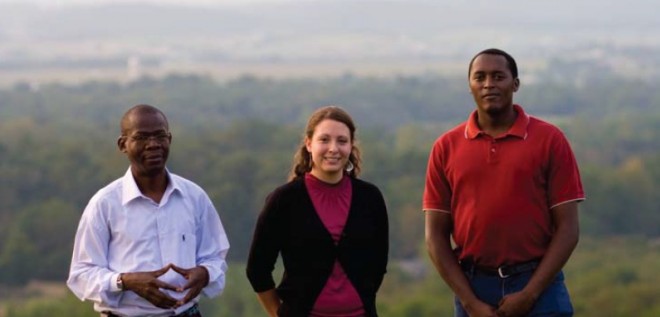
Four students from Kenya are at CJP now, pursuing an MA in conflict transformation.
One of these students (Jeannine Cinco) is American, but she was working in Nairobi last year at a vocational training school for disadvantaged girls when the violence occurred. The girls had gone to be with their families or to their orphanages during the Christmas break. All the girls returned to school by mid-January, a week late, but most came with horrible stories, said Cinco, a Catholic Relief Services volunteer at that time. “We tried to help them process their experiences and journey with them.”
The three Kenya-based students are:
- Jude Fondoh, originally from Cameroon, but most recently a student of peace studies and international relations at Catholic University of Eastern Africa (Kenya).
- Muigai Ndoka, a native of Kenya, who spent last year working with his wife Valerie at a center for rehabilitating street children in Moshi, Tanzania.
- Dennis Oricho, a Kenyan well educated in Catholic theology, who spent last year studying conflict analysis and resolution at Sabanci University in Istanbul, Turkey.
For Ndoka and Oricho, whose families live in areas affected by the post-election violence, it was particularly hard to be on foreign soil, too far to help their loved ones.
“My parents could not go out of the house for five days,” said Ndoka. “They ran out of food and water.”
Asked about his ethnic group, Ndoka politely side-steps the question: “I prefer to simply call myself ‘Kenyan.’ We have to get beyond our tribes of origin and view ourselves as equal citizens in one nation.
“When people settled into Nairobi, they seemed to settle by tribe,” Ndoka adds. “There is a good aspect to this – in village life, everyone shares everything – so people found others who would help them in the city.
“But the city has become crowded, the slums in particular. And tribes are spilling over, bumping into each other. We must find a way to address these problems that don’t pit one tribe against the other.”
Oricho’s mother and siblings support themselves by buying fish caught in Lake Victoria, taking it to a city market, and selling it. “Some of my mother’s best customers are Kikuyu,” Oricho notes. His family is Luo.
The violence caused their business to grind to a halt for two months. It was dangerous to walk in the streets, much less sell fish in the market. One of his brothers was caught on his way to the market by Kikuyu youths who yelled “You are Luo!” and beat him so badly, he required three days of hospitalization.
Today, the news from home is better. Oricho says his mother’s Kikuyu customers have resumed buying her fish.
The media, says Oricho, initially fanned the flames of the conflict by news reports that made everyone more fearful and more determined to defend themselves – or to seek revenge.
But gradually the media shifted, offering different stories: about the member of Parliament who led a group to rebuild the destroyed home of a poor woman and who gave her goats to restart her flock; about the police officer who talked to an angry crowd and calmed them down instead of threatening them; about the Red Cross and other non-government organizations who were trying to help the hundreds of thousands of displaced people.
Some church leaders persuaded their members to prepare food and to share it with those previously viewed as the enemy, with amazingly positive results.
At her girls’ vocational center in Nairobi, Cinco noticed that certain radio announcers – she mentions Caroline Mutoko in particular – stayed on the air hour after hour, day after day, pleading with their listeners, “We’re better than this! It’s our Kenya! We have to stop killing each other!”
